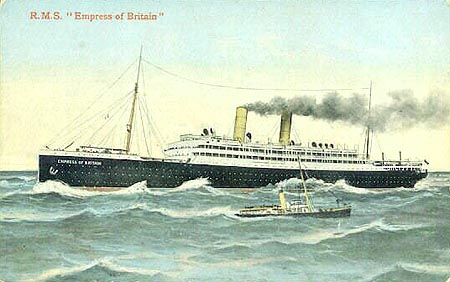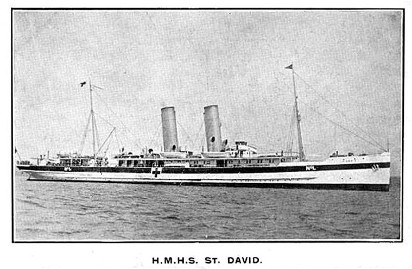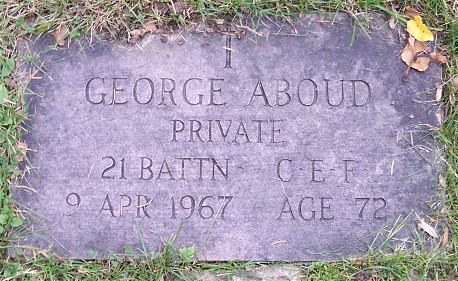|
Jan 5, 1895
|
Born in Hubunrhugh (Tripoli),
Syria to Joseph Aboud
|
|
Jan 31, 1916
|
Attested into the 93rd
Battalion in Peterborough, ON
Ø Number 195613
Ø Next of kin given as
his father, Joseph Aboud of Hubunrhugh, Syria
Ø Previous occupation
given as Labourer
Ø Religion given as
Greek Church
|
|
Jul 15, 1916
|
Sailed from Halifax on the
ship S.S. Empress of Britain

|
|
Jul 25, 1916
|
Arrived and disembarked in
Liverpool, England
|
|
Sep 5, 1916
|
Transferred to the 39th
Battalion and admitted to the West Cliff Canadian Eye and Ear Hospital in
Folkestone, England – Private Aboud was admitted for conjunctivitis and
trachoma (bacterial infection) in each eye which was present before he
enlisted. (since 1907). The doctor has
determined that he is not fit for service overseas, and it is recommended
that he be returned to Canada for treatment. (It seems this did not happen.)
Vision is 6/12 in each eye and glasses have not been ordered.
|
|
Oct 9, 1916
|
Discharged from Hospital and
transferred to the CCAC (Canadian Casualty Assembly Centre). This was a
centre where the wounded were assessed for either further treatment or were
returned to duty.
|
|
Oct 11, 1916
|
Private Aboud appeared before
the medical board in Shorncliffe, England where it was recommended that he be
discharged from the hospital and T.O.S. (taken on Strength) to the 39th
Battalion
|
|
Nov 24, 1916
|
George was S.O.S. (Struck off
strength) from the 39th Battalion on transfer to the CCAC
|
|
Mar 29, 1917
|
West Cliff Canadian Eye and
Ear Hospital in Folkestone, England – Doctor states the George has been
suffering from trachoma in both eyes but it has now healed and should give
him no further trouble. He is fit for overseas duties. Recommends patient for
class “A” being fit for general service.
|
|
Mar 31, 1917
|
Discharged from hospital as
eyes have healed and T.O.S. (Taken on Strength) to the 6th Reserve
Battalion in England
|
|
May 3, 1917
|
S.O.S. (Struck off Strength)
on transfer into the 21st battalion
|
|
May 4, 1917
|
Arrived and T.O.S. (Taken on
Strength) to the 21st Battalion at the CBD (Canadian Base Details)
|
|
May 7, 1917
|
Left to join the 21st
Battalion
|
|
May 31, 1917
|
Joined the 21st
Battalion in the field
|
|
Jul 14, 1917
|
Wounded at Vimy Ridge. Private
Aboud received a GSW (Gun shot wound) in his right arm and right side of
breast. The ulnar nerve in the elbow divided. Taken by C.F.A. (Canadian Field Ambulance) #4 to #58 CCS (Casualty
Clearing Station) where the wound was cleaned.
|
|
Jul 16, 1917
|
Admitted to the #26 General
Hospital in Etaples, France for G.S.W. (gun shot wound) to the right arm and
breast
|
|
July 22, 1917
|
Had an operation to fix the
nerve in his arm. (The Ulnar nerve in elbow).
|
|
Aug 5, 1917
|
Invalided and posted to the
E.O.R.D. (Eastern Ontario Regimental Depot) in Seaford, England per Hospital
Ship “St. David”

|
|
Aug 7, 1917
|
Admitted to the King George
Hospital, Stamford Street, London, England
|
|
Oct 24, 1917
|
Private Aboud had another
operation to free the nerve from the surrounding tissue
|
|
Nov 13, 1917
|
Transferred to #16 Canadian
General Hospital in Orpington, Kent, England
|
|
Jan 14, 1918
|
Private Aboud has continuing
pain and numbness. He received a burn on his little finger but was unaware
when it happened.
|
|
Jan 15, 1918
|
He had another operation to repair
nerve in arm which was inhibited by scar tissue at the #16 General Hospital
in Orpington, Kent, England
|
|
Jan 23, 1918
|
Sutures were removed
|
|
Apr 10, 1918
|
Medical Board - Ontario
Hospital in Orpington, Kent, England. Private Aboud still complains of
pain. It is recommended he be sent to
Canada for further treatment.
|
|
Jun 3, 1918
|
T.O.S. (taken on strength) to the #3 D.D.
(district Depot) and invalided to Canada on the Hospital Ship “Neuralia”
sailing from Avonmouth, Bristol, England
|
|
Jun 14, 1918
|
Arrived and disembarked in Halifax, Canada
|
|
Jun 16, 1918
|
Queen’s Military Hospital in
Kingston, Ontario – admitted due to the effects of the G.S.W. (gun shot
wound), sustained in action overseas, to his right arm causing some nerve
problems in that arm. Private Aboud complains of burning sensation of the
ulnar nerve. He still has a piece of shrapnel, ¾ “x3/8” on left side bout 3.5
“from mid spinal line which will be removed. There is another piece on the
right side of the spine about 1” from mid spinal opposite 2nd
lumbar vertebrae.
|
|
Jun 17, 1918
|
Granted Leave until July 1,
1918
|
|
Aug 1, 1918
|
Granted Leave until August 8,
1918
|
|
Sep 12, 1918
|
Medical Board Q.M.H.(Queen’s
Military Hospital) Kingston determined
that George has practically no use of his right hand and state that he should
be discharged with a pensionable disability. His eyes, however, have healed
and vision is 20/20 in each eye. B.P.C. (pension #) 47533
|
|
Sep 17, 1918
|
Discharged from Queen’s
Military Hospital
|
|
Sep 20, 1918
|
Discharged in Kingston, ON
military district Number 3, category “E” meaning unfit for service and not
likely to become fit within 6 months
Ø Rank on discharge Private
Ø War Service Class Badge “A” 50263 and “B” #
C,
42807 on page 20 it has class “A”
badge # 425624 sent
to 14 Cumberland street, Toronto 5,
Ontario
Ø Proposed residence after discharge Peterborough,
ON
Following his discharge the
British War Medal and Victory Medals were sent to him
|
|
Oct 4, 1961
|
Service badge Class “A”
#425624 was sent to George at 14 Cumberland Street, Toronto 5, Ontario
|
|
Apr 9, 1967
|
George died on this day and
was buried in the York Cemetery, Toronto, Ontario

|
|